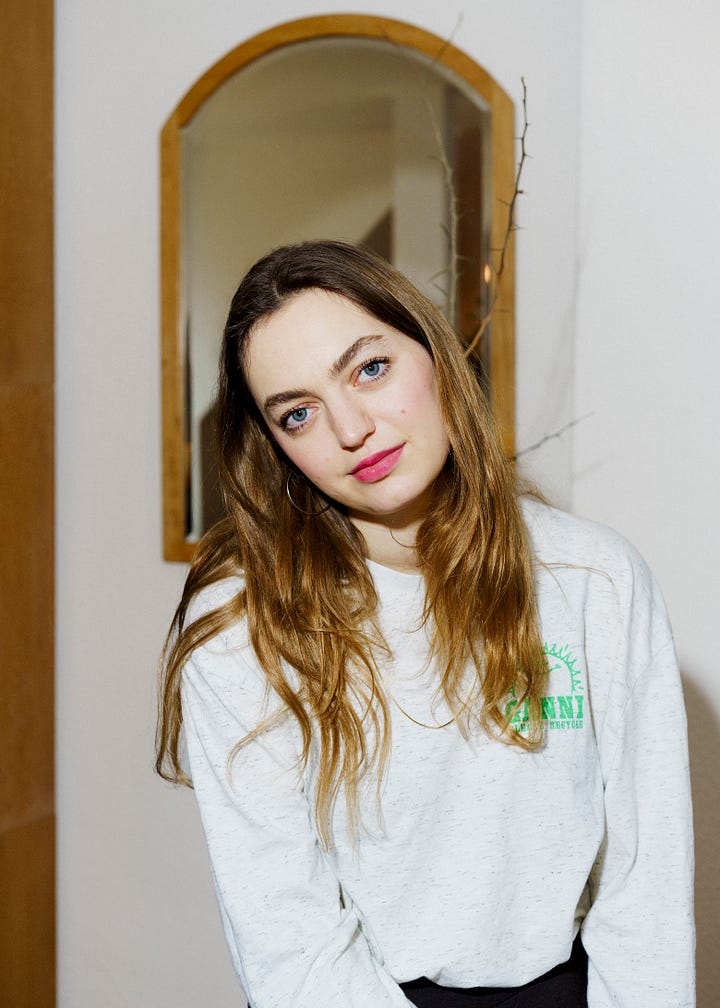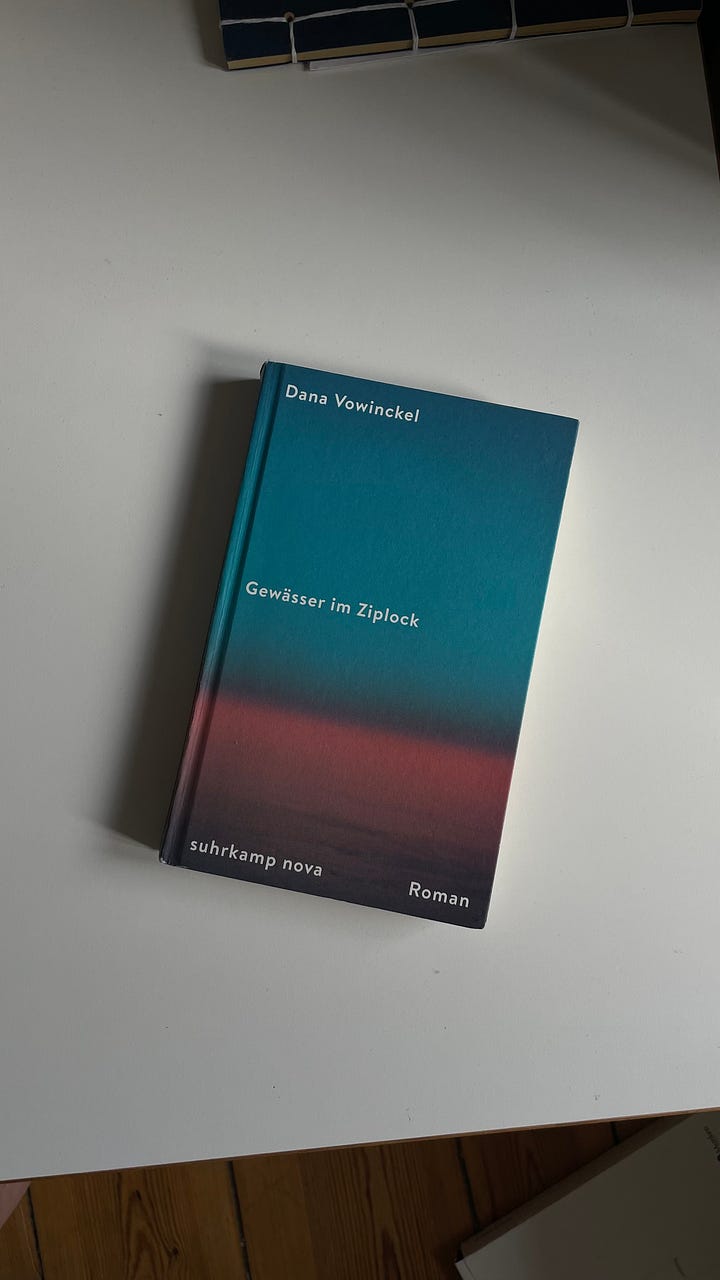Fellow Readers #2: Dana Vowinckel, Berlin & New York
Fellow Readers is all about highlighting a new book lover from our community, their current projects and favourite reads.


I first heard about Dana Vowinckel and her debut novel Gewässer im Ziplock through my friend Anna Fiedler (find her guest post here!) in the autumn of 2023. But it took me almost a year to finally read it myself, and it blew me away.
The book follows Margarita, a 15-year-old Jewish girl who was born in Berlin but is just as deeply shaped by the homelands of her separated parents – Chicago and Tel Aviv. As a result, questions of identity and belonging feel overwhelmingly complex. On top of that, she’s 15, and at that age, everything feels complicated and overwhelming – anger and frustration are always close at hand. After spending her summer with her grandparents in Chicago as usual, she embarks on a spontaneous trip to Tel Aviv to visit her estranged mother, who is currently doing research there. A lot of things don’t work out as planned, her somewhat overprotective father, a cantor, tries to meddle from afar, and so the complex story unfolds. Along the way, she not only meets Lior but also confronts big questions about belonging, heritage, Jewish identity, conflicts and family expectations.
Die bestellte Bolognese kam. Marsha streute Parmesan darüber. Margarita sah den Seitenblick ihres Vaters. Eine plötzliche Wut überkam sie, vielleicht wegen des Nachmittags bei Pnina, vielleicht weil sie fand, er sah scheiße aus, wie er dasaß und in sein Risotto schwitzte.
The story not only spoke to me personally, as some aspects of Margarita’s life are quite similar to mine. But also because the book provides such a vivid insight into a complex teenage mindset. It was a truly special experience to look back at this deeply emotional and formative time from a distance and reflect on it. I already recommended the book once, but will do it again and again since it’s written so amazingly.
The English translation of the book will be available on May 6, 2025, with the title
Misophonia.
To shortly introduce the writer behind the book to you: Dana Vowinckel was born and raised in Berlin and was awarded the Deutschlandfunk Prize for an excerpt from her book at the Ingeborg Bachmann Competition 2021. It won several awards after it was published and was shortlisted for the Leipzig bookfair prize. I had the huge honour to ask her a few questions about books and literature for our Fellow Readers category.
What are you currently reading?
Dana Vowinckel: I'm currently reading Nora Osagiobare's Daily Soap, published by Kein und Aber. It's a hysterically funny satirical novel about racism and classism in Switzerland. Also, I am re-reading Paul Auster's The New York Trilogy. I have a difficult relationship to New York, I go back and forth between there and Germany, but Auster's books comfort me and soothe the anger I feel towards the U.S. and this broken city these days.
Since you were born in Berlin and, as you said, go back and forth between Berlin and New York, do you have hidden literature gems in each city you can recommend?
Dana: In Berlin, I think I would recommend, begrudgingly (it's already too crowded), the place where I like to write: the Staatsbibliothek am Potsdamer Platz. It's an incredible building in desperate need of renovation, so they're going to close it in two years for ten years (or until I have grandchildren, I assume). And it would be insane not to have lunch at Rocket & Basil while in the area. They have a chicken schnitzel sandwich that is so tempting I forget I try to be a vegetarian.
In New York, I'd recommend Albertine, the French bookshop on the Upper East Side. And afterwards, you can go to Neue Galerie's Café Sabarsky and eat Sachertorte and cry because you're homesick. I've never done this. Just an idea. (I've definitely done it). Also, there's a place in New York called Sweet Pickle Books. They sell Pickles and Books. The Tenement Museum is around the corner and they also have an amazing bookstore. And afterwards, you can eat the best bialy of your life at Elbow bakery. Honestly, I'm much more knowledgeable on food spots than on literature spots. I'm sorry!
Which book made you want to write yourself, and why?
Dana: I don't think there's one particular book, perhaps more characters in novels, films or series. Hannah Horvath in Girls, for example, Julia Franck's Helene in her novel Die Mittagsfrau. But I think the book that so overwhelmed me with the beauty of prose that I thought I'd like to try it one day was Sommerhaus, später by Judith Herrmann. I read it so often under the table in English class that at some point I was kicked out of class. The same with Katharina Hacker's Tel Aviv. Marguerite Duras' La Douleur I read during my time in Cambridge and I think it taught me how to truly read, which is what you need to be able to do to write. Later, I read Olga Grjasnowa's Der Russe ist einer, der Birken liebt and decided to give writing a real try because of her protagonist, Mascha. I think there are certain female characters that never leave my system. I write because of them.
Is there a book that you turn to again and again?
Dana: Some, especially the ones I've just mentioned. In terms of their narrative structure, American novels still influence me the most, and I often go back to them when I'm trying to plot: the most important of these is probably Freedom by Jonathan Franzen, but I also often go back to Siri Hustvedt's What I loved. And then, of course, the books by friends that comfort me because they sound a little bit like these friends themselves, for example Charlotte Gneuss' Gittersee. And, of course, poetry is an excellent thing to pick up again and again, because you discover something new in it every time, as you are never the same reader. The poems of Paul Celan accompany me through life. I love May Ayim's poetry and go back to it often. As a teenager, I was obsessed with e.e. cummings, and I still love the cadence of his poetry.
I pick up some book I've read at least once a day when I am at home in Berlin with my bookshelf. When I'm in New York, I fantasize about my books. I go through them in my head. My Max Frischs, my Primo Levis, my Saša Stanišićs, my edition of Rebecca Makkai's The Great Believers and of Mely Kiyak's Frau sein. I'm not really a bibliophile, I'm just extremely attached to objects. My little bowl, my candle shaped like a piece of cheese. It's kind of pathetic.
Thank you so much Dana, for your time, your insights and thoughts and your amazing words.
—Shirley
Fellow Readers #1: Camilla Zuleger, Copenhagen
Camilla Zuleger and I first connected on Instagram years ago, back when Reels were still a distant idea and discovering new people revolved around shared, often niche interests – for us, books were at the heart of it.






